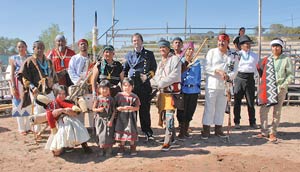Descendants honor Treaty of 1868
By Noel Lyn Smith and Lemanuel Loley
Navajo Times
WINDOW ROCK, June 7, 2012


(Times photo - Paul Natonabah)
TOP: Reenacting the Treaty of 1868 signing June 1 were, left to right, chief's wife, Amber Arviso-Salazar; Herrero, Johnson Paul; Ganado Mucho, Dean James; Delgadito, Harrison Paul; chief's wife, Delores Paul; Gen. William Sherman, Paul Spruhan; Barboncito, Ray Paul; Hombro, Ike Johnson; Largo, Robert Tsinnajinnie; Chief Manuelito, Tully Descheny; Juanita, Katie Yazzie; Jesus Arviso, Benjamin D. Yazzie; and Narbono Segundo, Ambrose Chee. Front, from left, Esther Shonnie and twins Monreatta Yazzie and Tabitha Shonnie.
BOTTOM: General William Tecumseh Sherman, (Paul Spruhan) signs the 1868 Treaty while Chief Manuelito and his people watch June 1 at the Window Rock fairgrounds.
The treaty allowed the release of about 9,000 Navajos from Hwééldi after four years of detainment by the U.S. government.
When Arviso was 12, she was part of a Farmington softball team that traveled to Las Cruces, N.M., for a state tournament.
On the way home, her family stopped at a museum in Fort Sumner, N.M., to learn more about the Long Walk. It was there when she saw a photograph of her great-great-great-grandfather, Jesus Arviso.
Jesus was 13 years old when the Apache traded him to the Navajos. He was bilingual in Navajo and Spanish and served as interpreter for the Navajo leaders during the treaty negotiations.
On her mother's side, Arviso is a descendant of Manuelito.
"It's how my blood and name was founded," Arviso said. "I think we need that, to stay connected to all this."
About 50 people attended the reenactment June 1 at the Annie Wauneka Arena at the Navajo Nation fairgrounds.
At the center of the arena were 20 individuals who portrayed the Navajo leaders and U.S. government officials who signed the treaty at the Bosque Redondo Indian Reservation.
Among the actors was Ambrose Chee, of Piñon, Ariz., who portrayed Narbono Segundo.
"If we don't know where we come from, we don't know where we're going," Chee said.
Delores Paul was 12 years old when she participated in the reenactment of 1968.
Paul, of Cowsprings, Ariz., was part of that reenactment with her grandparents Katherine Hart, Tulley Mitchell and Sadie Yazzie.
This time around Paul portrayed a chief's wife and said celebrating the importance of the treaty in Navajo history was the reason she participated.
"It's to survive," she said.
But for Ashkii Adeky, the reenactment was not a cause for celebration.
Adeky stood in silent protest on the arena's north side.
He opposed honoring the treaty because many social issues continue to face the Navajo Nation and leaders refuse to find solutions.
Instead, the treaty continues to "imprison" the Navajos, he said.
When President Ben Shelly spoke at the beginning of the event, Adeky held a sign with the message "Shelly read a book, treaty dumb."
Throughout the reenactment, Adeky switched signs with messages like "Trash 2109 renegotiate treaty, shaft the U.S." and "Shelly and friends get richer Navajos stay poor."
"It is time someone stood up," Adeky said. "The real warriors need to stand up."
Amber Arviso-Salazar also portrayed a chief's wife and was bothered by Adeky's action because she felt it was inappropriate.
"There are a lot of negative and positive feelings about it but I personally think it was a good change in our history," she said.
Like Vicki Arviso, Arviso-Salazar is a descendant of Jesus Arviso.
Each of the actors was required to learn about the person they were portraying but Arviso-Salazar did not study her role.
Instead, she focused on the treaty and took to heart the article that deals with education.
"The reenactment of the treaty was very exciting because it is something that's not done very often," she said. "I am very proud that I was selected to do the reenactment and it is something that I will hold to my heart."

